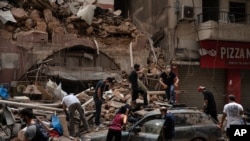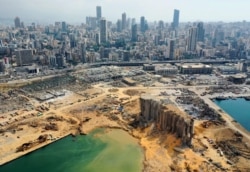The United States is delivering emergency aid to Lebanon, starting with food, water, and medical supplies, under the direction of President Donald J. Trump following Tuesday’s blast in Beirut, national security adviser Robert C. O’Brien said Friday.
In addition, the U.S. will continue to work with authorities in Lebanon to identify further health and humanitarian needs and will provide further assistance. The U.S. Agency for International Development is deploying a disaster assistance response team to help coordination and delivery of assistance, the statement said.
The Trump administration has initially pledged more than $17 million in disaster aid for the country, Secretary of State Michael Pompeo, said, and “will continue to help the Lebanese people as they recover from this tragedy.”
I addition to providing aid, Pompeo said, the U.S. is joining other nations in the call for “a thorough and transparent investigation” into the cause of the explosion.
United Nations rescue workers searched the wreckage for survivors Friday. French and Russian rescue teams with dogs also searched the area Friday.
Lebanese authorities believe that 2,750 tons of ammonium nitrite stored in warehouses for the last six years led to the explosion of this week, which killed about 150 people, wounded more than 5,000, and left 300,000 other people homeless.
Among the wounded was the wife of Dutch ambassador to Lebanon, Hedwig Waltmans-Molier, who “succumbed to injuries sustained in the massive explosion in Beirut,” the Netherlands Ministry of Foreign Affairs said in a statement Saturday.
“Hedwig was standing next to Jan in their living room when, through sheer bad luck, she was hit by the blast,” the statement said. Waltmans-Molier was 55 years old.
Meanwhile, Lebanese officials say they expect the death toll to rise as they pick through the wreckage. Initial damage estimates are as high as $15 billion.
Lebanese health officials also fear the disaster will aggravate the coronavirus outbreak as victims pack hospitals and the homeless seek shelter.
Human Rights Watch was the first to call for an independent investigation of the explosion. The group said international experts should be allowed into Lebanon to “determine the causes and responsibility for the explosion and recommend measures to ensure it cannot happen again.”
Russia flew in a mobile military hospital along with 50 medical workers. Qatar is also sending a field hospital, while Iraq is supplying a crew of medical workers and truckloads of supplies.
Tunisia offered to bring patients there for treatment and Germany has dispatched a team of rescue experts and search dogs.
Cash pledges have come in from Australia, Britain, Hungary, and other countries.






